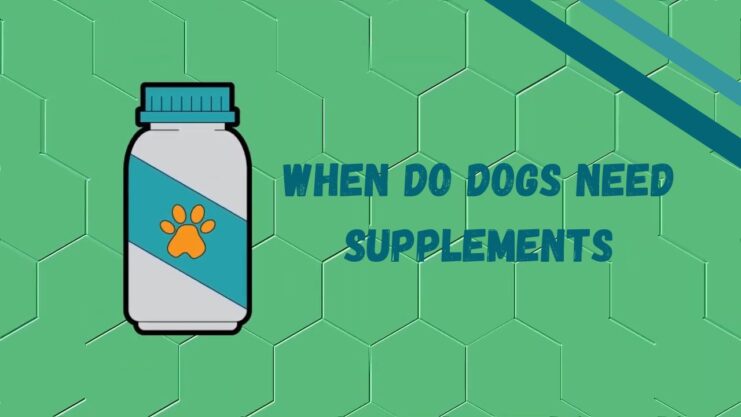It’s common for humans to take supplements to improve their health, and many pet owners wonder whether their furry friends need the same. But the need for supplements depends on several key factors.
While some dogs do need supplements, they can get sick if they eat too many. Keep reading to learn more about canine supplements.
Are Supplements Helpful for Dogs?
The need for, and benefits, of supplements depend on a dog’s diet, health, and age. Diet is the most significant determining factor, as over-supplementing a dog can cause adverse health effects. You may need to supplement depending on what your pup eats and the nutrients included in its diet.
Most commercial dog food claims to be nutritionally balanced, though you’ll need to read the ingredients to know if that’s really true. Even if the ingredient label lists all the best fruits, veggies, and meats, it may be hiding the fact that many nutrients were cooked, blended, or ground out and are no longer helpful.
It’s essential to research the food you feed your furry friend. Fido may need a boost of something, but you don’t want to cause illness.
Before giving your dog any supplement, consult your vet to determine which supplements would be the best..
Do You Need to Add Supplements to a Raw Dog Food Diet?

While some raw diets contain all the necessary nutrients, most raw-fed dogs do need supplements to maintain their health. Some raw food preparation methods strip vital nutrients from ingredients, and not all food sources are created equal when it comes to nutrition.
Canine supplements may also support your dog’s health based on the recipes you use for creating raw food. Take notes of what you feed your dog and its reactions to determine whether you should incorporate any additional supplements. Check out this supplement from drharveys.com for your dog.
Do Supplements Help Dogs Manage an Illness or Condition?
When your furry friend isn’t feeling well, it’s understandable to want to find a solution ASAP. However, supplements won’t be effective without the support of a balanced diet. The combination of a proper diet and necessary supplements is the best way to tackle symptoms of different illnesses, such as:
- Anxiety
- Depression
- Joint problems
- Kidney disease
- Osteoporosis
- Skin problems
Do Dogs Need Supplements as They Age?
Puppies need certain nutrients, like calcium and protein, to ensure their bodies grow without complications. Similarly, as a dog ages, certain parts of its body won’t work as well as they once did.
The kidneys and joints tend to suffer most in older dogs, and supplements can help if you don’t feed your pup a diet catered to those specific needs. For example, omega-3 supplements are great for joint problems and inflammation. Read more here.
What Kind of Supplements Are Best for Dogs?

The best supplements depend on each dog’s unique health needs. Here are the most common supplements used for dogs and their benefits.
Vitamin A
Vitamin A can improve vision, immune function, and reproduction, as well as cell growth, which supports all body processes. Read more about the benefits of Vitamin A here.
Vitamin B
Vitamins in the B family go by many names other than vitamin B, such as:
- Biotin
- Folate
- Niacin
- Riboflavin
- Thiamine
Each vitamin plays a different but crucial role in keeping your dog healthy. Examples include:
- Breaking down fat and protein
- Generating glucose
- Regulating hormones
- Distributing energy
- Improving cognitive function
- Improving skin condition
- Maintaining metabolism
- Ensuring proper function of the nervous system
- Promoting enzyme functions
Vitamin C
Vitamin C is not only good for your furry friend’s immune system, but also reduces inflammation, improves iron absorption, and keeps your pup’s brain sharp through the aging process. This powerful antioxidant aids in eliminating elements that cause inflammation, such as free radicals.
Vitamin D
Vitamin D can help maintain proper phosphorus and calcium levels to support bone growth and strength. This vitamin also plays a role in strong, healthy teeth.
Omega-3
Omega-3 is probably best known for reducing inflammation and improving joint health. This supplement can also boost brain, skin and coat, kidney, heart, and liver conditions.
Probiotics
Probiotics help with digestion. When a dog struggles with digestion, it can affect the entire body. Your pup may have less energy, become susceptible to illness, and even feel depressed.
The digestive system includes good and bad bacteria. When harmful bacteria overwhelm the good, digestive problems often result. Probiotics are filled with good bacteria, helping the body maintain proper balance.
Do Supplements Make Dogs Sick?

Some pet parents don’t use supplements because they fear making their dogs sick. It’s a valid concern—there is such a thing as over-supplementing. This concern is why it’s so crucial to note your dog’s diet, especially if it eats raw food.
Here’s what can happen when a dog has too much of any one supplement:
- Omega-3: Diarrhea, vomiting, weight gain, weakened immune responses
- Probiotics: Bloating, gas, stomach pain, and vomiting
- Vitamin A: Bone growth around joints causing pain and stiffness
- Vitamin D: Diarrhea, kidney problems, lack of appetite, muscle weakness, vomiting
You should also make sure none of the supplements contain xylitol. This sugar crystal is toxic to dogs, causing liver problems and blood sugar levels to drop. It’s often found in chewable or fast-melting supplements. Read more about which supplements to stay away from here.
Why Does Over-Supplementing Happen?
You might wonder why Vitamin B and C aren’t on the list above. Overuse of these vitamins is rare because they’re water-soluble.
Supplements can be broken into two categories: water- and fat-soluble. Water-soluble supplements like vitamins B and C dissipate in water, so it’s less common for these vitamins to build up in a dog’s system. Even if a dog ingests more than is needed, the excess will typically exit the body through urination.
Meanwhile, fat-soluble vitamins like vitamins A and D are stored in fatty tissue. While it’s great for keeping a dog going throughout the day, this factor means a buildup is more likely to occur.
Think of your dog’s body as a machine. Everything has to work together in sync to function correctly. But if one gear spins too fast or a component overheats, the problem throws the whole machine into chaos.
Over-supplementation is the chaos that throws things off in your furry friend’s body. All the vitamins and minerals in your dog’s body need a precise balance to keep all systems running smoothly.
Balance Is Everything When Giving a Dog Supplements
The possibility of over-supplementing shouldn’t scare you away from using supplements in your dog’s diet. Instead, be encouraged to take note of your dog’s nutritional needs and identify any potential gaps.
When giving supplements, start with small doses to allow the body to adjust to the new addition. Keeping your beloved canine companion healthy starts with proper nutrition. As long as you put in the effort and do some research, your furry friend can live their best, healthiest life.

